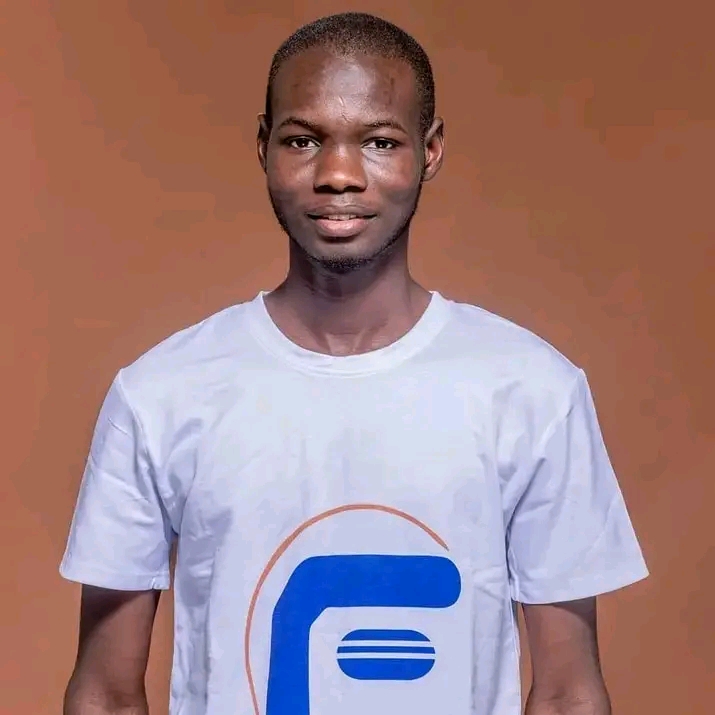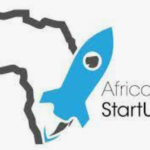In 2022, fresh out of high school, Muqaddas Bamanga was keen on learning a skill that would fetch him money. His first stint was at a computer business centre, where he learnt to type and print documents. He took a liking to graphic design after his brother opened his eyes to more digital skills. As his brother was too busy to coach him, Bamanga struck out on his own, resorting to social platforms to refine his new-found craft.
“Social media led me to Abu Ibrahim, a graphic design guru. I enrolled in his online course, where I mastered graphic design and video animation. As time went on, I craved to learn even more skills, and I reached out to my brother, who recommended Flowdiary, an online school. So, I embraced the opportunity and registered for their social media management course in July 2023,” recalled Bamanga, who resides in Namtari District of Yola South in Nigeria’s Adamawa State.
Flowdiary, an online edtech platform, bridges the digital divide for young people in Hausa-speaking communities across Africa by delivering tech skills training in Hausa. This training, which covers a range of courses, including web development and graphic design, empowers them to build successful careers in the rapidly rising tech industry.
Mahadi Umar, like Bamanga, had nursed a desire for a remunerative digital skill. But the 25-year-old wasn’t sure how to start.
One day, Umar stumbled on Flowdiary’s page as he was scrolling through his newsfeed. He wasn’t keen on joining the classes at first, but reading about their services regularly piqued his interest in Flowdiary. The lessons were taught in his native Hausa. He promptly signed up for a course.
“Content creation was the first course I signed up for and the fact that it was delivered in Hausa completely won me over,” Umar said.
Flowdiary was founded to fill the linguistic gap created by existing tech academies, said Muhammad Auwal Ahmad, the platform’s founder. Owing to language difficulties, young people in Africa who are keen on digital knowledge find it challenging to keep up with their peers in other cultures.
With more than 50 million speakers, Hausa is the most widely spoken native language in Nigeria. This language from the Afroasiatic family flourishes in northern Nigeria, featuring mostly youthful speakers.
Sensing the keen desire for tech skills among Hausa youths, Ahmad and a team of volunteers initiated Flowdiary as a beacon of hope for these young minds, including unemployed Nigerian graduates.
“To support self-reliance, we set up Flowdiary to help our fellow youths learn digital skills,” Ahmad said.
The birth of Flowdiary
As a young teenager growing up in the Nigerian state of Yobe, Ahmad didn’t have any mentors to steer him on his career path. Yet he recalled a gift from his boyhood that opened his eyes to the digital world.
In 2011, his father bought him a computer. With limited access, he learnt basic computer skills, such as Microsoft Word. When, in 2014, Ahmad received complete access to the computer, his pent-up curiosity led him to explore websites and how they are developed.
“I met my first mentors, Ibrahim Yunusa Abuamma and Muhammad Babagoni who helped me to build my first website in that same year. Within 2015 and 2016, I was already learning how to code. Then, in January 2017, I launched my first internet startup, Skyvillo, a social network that connects business owners,” Ahmad told Prime Progress.
However, the social network failed less than a month after it was launched, despite the efforts and resources he invested in it. With guidance from his newfound mentors, Ahmad shifted his focus to blogging while honing his coding skills. He also began freelancing as a web developer. That soon ended in November 2017, when Ahmad shut down the blog and focused on his undergraduate studies in computer science.

Noting the frustration he experienced in finding a mentor as a youngster, Ahmad had an epiphany: He would offer needed guidance to youths enthusiastic about tech. The result of this was Flowdiary, founded in March 2022.
Access to learning materials
While crafted in Hausa, Flowdiary’s learning lessons are accessible in video clips available on its website. Its website offers a simple user interface that allows for smooth registration, using their email address and phone numbers.
Once logged in, users can select their desired courses. Paying a registration token allows users unfettered access to lecture materials.
“Our platform is designed in such a way that you can access lectures wherever you are and whenever you like. It is learning at your own pace. Just log into your dashboard, click your course and start. Our lectures are arranged in a simple form, starting from Lecture 1, Lecture 2 to the rest,” Ahmad shared.
Flowdiary boasts a seamless, up-to-date curriculum that is at par with the emerging trends in the tech industry.
Students are paired with mentors once they have completed their course training, to assess their progress and further refine their skills to enable them to land jobs. Students can download their certificates immediately in a printable PDF format.
“We also provide an internship programme, allowing students to request for internships. Then, we talk to companies (especially the ones that are operated online) to allow us to send them interns. The benefit of this programme is to allow students to expand their knowledge in not only the skills but also learn how to operate in teamwork, and network with experts. Currently, we have sent 15 students to internships at various places,” Ahmad added.
Glowing reviews
Nearly 10,000 students have enrolled in Flowdiary since the platform’s launch, according to Ahmad. While it offers several paid courses, the platform also provides free courses in general internet entrepreneurship, equipping students with the knowledge to turn their newfound skills into profit.
“There are many students that have secured jobs because of the skills we taught them. Some of them have been reporting to us,” Ahmad noted.
After Bamanga completed training in graphic design and social media management, he clinched a role in an Islamic organisation as a social-media manager.
“I was able to manage their page and do graphic design for them. The page saw impressive growth in viewership within just a few months before I left to take another gig and enrolled in more classes that will improve my skills,” Bamanga explained to Prime Progress.
Although he was poised to learn video creation and graphic design, Umar segued into the volatile world of cryptocurrencies. Now he manages his own company. “I launched a blog where I have people working under me and established another startup that deals with cryptocurrency exchanges. Both ventures are flourishing and generating income,” he disclosed.
Umar’s blog, monetized through Google AdSense, brings him steady income. While he didn’t disclose his exact earnings, he maintained that the process of building his venture from scratch has been rewarding.
Not immune to challenges
Amid its flourishing testimonies and success stories, Flowdiary continues to grapple with currency fluctuations and power outages, pushing up the cost of service and disrupting their operations. Zubairu Saeed, a course leader in web development and one of Flowdiary’s 10-man team, stresses the difficulty of translating technical knowledge into Hausa. Finding precise equivalents for specific terms can be a hurdle, he explained.
“This tasks me to continuously research, even though it is my native language, and maybe collaborate with language experts and professionals,” Saeed said.
Ahmad also cites students’ grand expectations as another challenge. Some approach Flowdiary with a “get-rich-quick mindset,” desperate to complete courses and start earning immediately. “They don’t understand the time and dedication required to build a successful career in tech,” Ahmad bemoaned.
To address this, Flowdiary conducts weekly webinars to enlighten students on the realities of the tech industry. Their goal is to empower students to build sustainable careers, not become rich overnight.
New learners may come to find that learning demands huge Internet data, which costs quite a lot. Umar, for instance, grappled with limited data access because securing enough data bundles to stream his lessons comes with difficulty. “Sometimes, late-night subscriptions were my only option,” he revealed, adding that the unstable power supply in his community also threw another hurdle his way.
Bamanga’s experience, however, was a different story. “My studies were free of disruptions,” he expressed.
The road ahead
Both Bamanga and Umar have their sights set on the future. Bamanga eagerly anticipates returning to Flowdiary to expand his skillset. Umar, whose future aspirations remains under wraps, has exciting plans ahead.
Meanwhile, Flowdiary hopes to take on more territories outside Nigeria, as Ahmad explained. “We are already reaching students in Niger Republic, Libya, and Chad. Our vision is for Flowdiary to become the world’s leading Hausa-based edtech platform,” he stated.
In 2022, Muqaddas Bamanga, a new high school graduate, sought to enhance his financial opportunities by learning digital skills, initially through social media and later by enrolling in courses from Abu Ibrahim and Flowdiary. Flowdiary, an edtech platform founded in March 2022 by Muhammad Auwal Ahmad, aims to bridge the digital divide for Hausa-speaking youths in Africa by offering tech training in their native language. The platform has successfully trained nearly 10,000 students, providing courses in web development, graphic design, and social media management.
Flowdiary's curriculum is accessible and up-to-date, arranged in a user-friendly format with video lessons and mentorship opportunities. The platform also supports internships and offers free courses in internet entrepreneurship. However, Flowdiary faces challenges such as currency fluctuations, power outages, and students' unrealistic expectations for quick earnings. To combat these issues, they conduct weekly webinars to manage students' expectations about the time and dedication required for a successful tech career.
Despite these challenges, Flowdiary has made significant impacts. Bamanga secured a role managing social media for an Islamic organization, while Mahadi Umar, another student, ventured into cryptocurrency and established successful businesses. Flowdiary aims to expand its reach beyond Nigeria to other countries like Niger, Libya, and Chad, aspiring to be the leading Hausa-based edtech platform globally.






